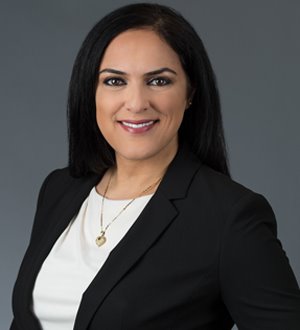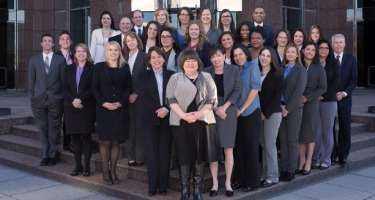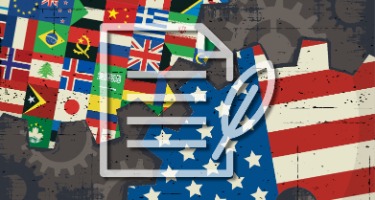The assessments of President Donald J. Trump’s first year in office have had a recurring stormy theme. Twists and turns in Washington D.C.’s status quo metaphorically matched a year of once-in-a-generation natural disasters such as Hurricanes Irma and Harvey, wildfires, and floods. These disruptive events were not limited to the U.S. domestic policy shorelines; indeed, global trade and mobility professionals experienced a year of hunkering down and riding out their own torrential storm—one with no relief in sight.
The tumultuous 2018 weather pattern has its sights set squarely on the North American Free Trade Agreement (“NAFTA” or “Agreement”), a comprehensive trade agreement between the United States, Canada, and Mexico, which began Jan. 1, 1994. The “tear it up” rhetoric from the 2016 Presidential campaign trail followed into the Trump Administration’s first year. There were occasional pauses for comments, ranging from “tweaks” to “modernization," “renovations," and “rebalancing” trade. Presently, the scope of results extends from finding a “win-win-win” solution for the three countries to finding a political win for the president in order to prevent the U.S.’s unilateral withdrawal from the Agreement. While the focus to date has been on the impacts of a NAFTA withdrawal on trade in goods, the most significant economic harm will be the disruption of the North American services and workforce.
Background
NAFTA created a preferential trading relationship between the parties and includes 22 Chapters addressing areas such as rules of origin, agriculture, government procurement and more. Chapter 16, entitled Temporary Entry for Business Persons, focuses on business immigration and the creation of a temporary NAFTA work visa category, designed to facilitate the movement of citizens of the United States, Canada, and Mexico. Specifically, it defines permissible activities that can be engaged in by business travelers as outlined in Appendix 1603.A.1, or temporary professional worker visas as outlined in Appendix 1603.D.1 of Annex 1603 to Article 1603 of the NAFTA.
What impact does NAFTA have on U.S. immigration?
NAFTA impacts four nonimmigrant visa categories in the Immigration and Nationality Act (INA)[1] including TN NAFTA professionals, E Treaty Trader and Investors; L-1 Intra-company transfers; and B-1 business visitors.
TN NAFTA Professionals
Following the entry into force on the NAFTA, the U.S. Congress added Section 214(e) of the INA to provide for the admission of Mexican and Canadian citizens to the United States, who were coming to engage in professional activities. This was a necessary step to “activate” NAFTA immigration provisions and create a TN nonimmigrant classification in the U.S. statutes. The TN classification permits qualified Canadian and Mexican citizens to seek temporary entry into the United States to engage in business activities at a professional level.
Notably, INA § 214(e)(2)[2] cross-references and refers directly to the NAFTA Appendix with respect to governing rules and procedures surrounding the TN nonimmigrant classification. While the INA provides the basic structure for the visa classification, the very existence and survival of the TN nonimmigrant classification is controlled by the Agreement. In short, there is no independent basis for a TN NAFTA visa should the President issue a Notice of Withdrawal from the NAFTA and the U.S. Congress roll-back the NAFTA implementing legislation.
Looking Ahead: What happens if there is a NAFTA withdrawal?
It follows that should NAFTA no longer exist in U.S. legislation, human resource professionals will need to examine other options for their North American workforce needs. One widely discussed option is the United States-Canada Free Trade Agreement (CFTA), which became effective January 1, 1989 and included a Trade Canada (TC) class of professional nonimmigrants. However, unlike NAFTA, it did not provide authority to create a visa classification under the INA and is entirely a creature of the agreement. Of greater significance, the CFTA was suspended when NAFTA entered into force. Specifically, the NAFTA Implementation Act, Section 107 (Termination or Suspension of United States-Canada Free-Trade Agreement), the CFTA implementing regulations “suspended” certain provisions of the CFTA while the U.S. and Canada remain parties to NAFTA. Also, certain CFTA provisions were “superseded.” While it is subject to dispute among legal authorities as to whether the CFTA could potentially “snap-back” into force after a withdrawal from NAFTA, it is our view that this would require a presidential proclamation and or other action by Congress to return the agreement into force. Consequently, we do not view the CFTA as a reliable option.
The most likely scenario is that TN workers present in the U.S. at the time of NAFTA withdrawal may possibly maintain their status through the expiration date of their TN visa, assuming that the foreign national remains in the U.S. However, any returning workers may not be granted re-admission to the U.S. in TN status. Finally, any initial or renewal TN NAFTA applications may immediately cease to be accepted for processing at a U.S. Port-of-Entry. We therefore strongly recommend renewing any TN NAFTA visa if it becomes clear the NAFTA renegotiation is failing in order to extend the time.
Employers with E Treaty Trader/Investor workforce may also be at risk. E-1 Treaty Trade and E-2 Treaty Investor visas are for citizens of countries with which the United States maintains treaties of commerce and navigation. The treaty upon which a company can rely upon for E status is NAFTA. If the U.S. withdraws from NAFTA, Canadian and Mexican citizens maintaining E status may also be at risk, and susceptible to the same exclusions described above. However, if the U.S. falls back on the CFTA, or another treaty of commerce with Canada and Mexico, the E visa for Canadians and Mexicans may be preserved.
The L-1 Intracompany Transfer visa classification may not be hit as hard. The L-1 classification will not disappear, but the processing of L-1 Petitions at the U.S. Port-of-Entry for Canadian citizens may be eliminated.
Similarly, the B-1 business visitor classification will not disappear. However, the extended permissible business activities under NAFTA may no longer be available.
Has immigration seen the worst of a Category 5 storm or is still more yet to come? Only time will tell. Meanwhile, employers and foreign workers alike should continue to brace themselves during the torrent—and hope that a new or modified agreement will preserve and improve the TN classification.
-----------------
Suzanne Sukkar is a U.S. Business Immigration Attorney at the law firm of Dickinson Wright PLLC, based in its Ann Arbor, Michigan office. Her practice focuses on global workforce mobility, employment-based sponsorship and visa matters, immigration audit, and compliance for corporate and individual clients across a vast array of industries. Ms. Sukkar’s honors include recognition from Best Lawyers in Immigration Law since 2015 and from Super Lawyers in Immigration Law since 2012, as well as DBusiness Top Lawyers, and Leading Lawyers 2018. She has been selected as a Fellow of the American Bar Foundation and Michigan State Bar Foundation, where membership is limited to only 1% and 5% respectively of lawyers licensed to practice in each jurisdiction. In June 2015, she was appointed to the State of Michigan’s Commission on Middle Eastern American Affairs by Michigan Governor Rick Snyder. She also serves on the Board of the American Arab Chamber of Commerce. Since 2005, Ms. Sukkar has served on the Women Lawyers Association of Michigan state and regional boards and is currently the Immediate Past President.
-----------------
[1] The Immigration and Nationality Act (“INA”) was created in 1952 and is a comprehensive U.S. federal law that deals with immigration, naturalization, and exclusion of aliens. Today, it is the primary governing immigration statute. “Before the INA, a variety of statutes governed immigration law but were not organized in one location. The McCarran-Walter bill of 1952, Public Law No. 82-414, collected and codified many existing provisions and reorganized the structure of immigration law. The Act has been amended many times over the years, but is still the basic body of immigration law used today” —U.S. Citizenship and Immigration Services).
[2] “An alien who is a citizen of Canada or Mexico, and the spouse and children of any such alien if accompanying or following to join such alien, who seeks to enter the United States under and pursuant to the provisions of Section D of Annex 1603 of the North American Free Trade Agreement (in this subsection referred to as ("NAFTA") to engage in business activities at a professional level as provided for in such Annex, may be admitted for such purpose under regulations of the Attorney General promulgated after consultation with the Secretaries of State and Labor.” See INA 214(e).























